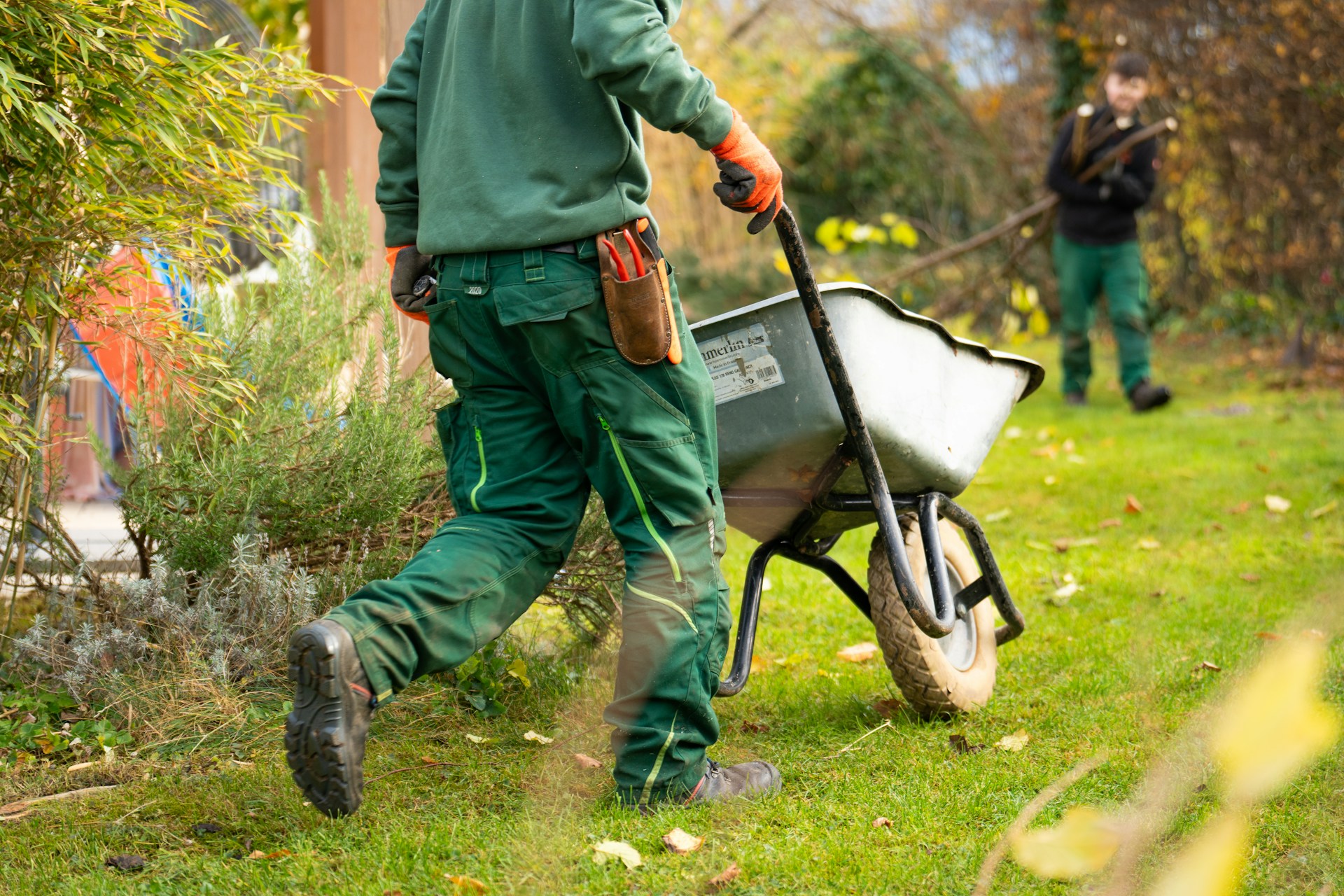Gardener Cost Calculator UK 2025: Rates, Fees and Regional Pricing
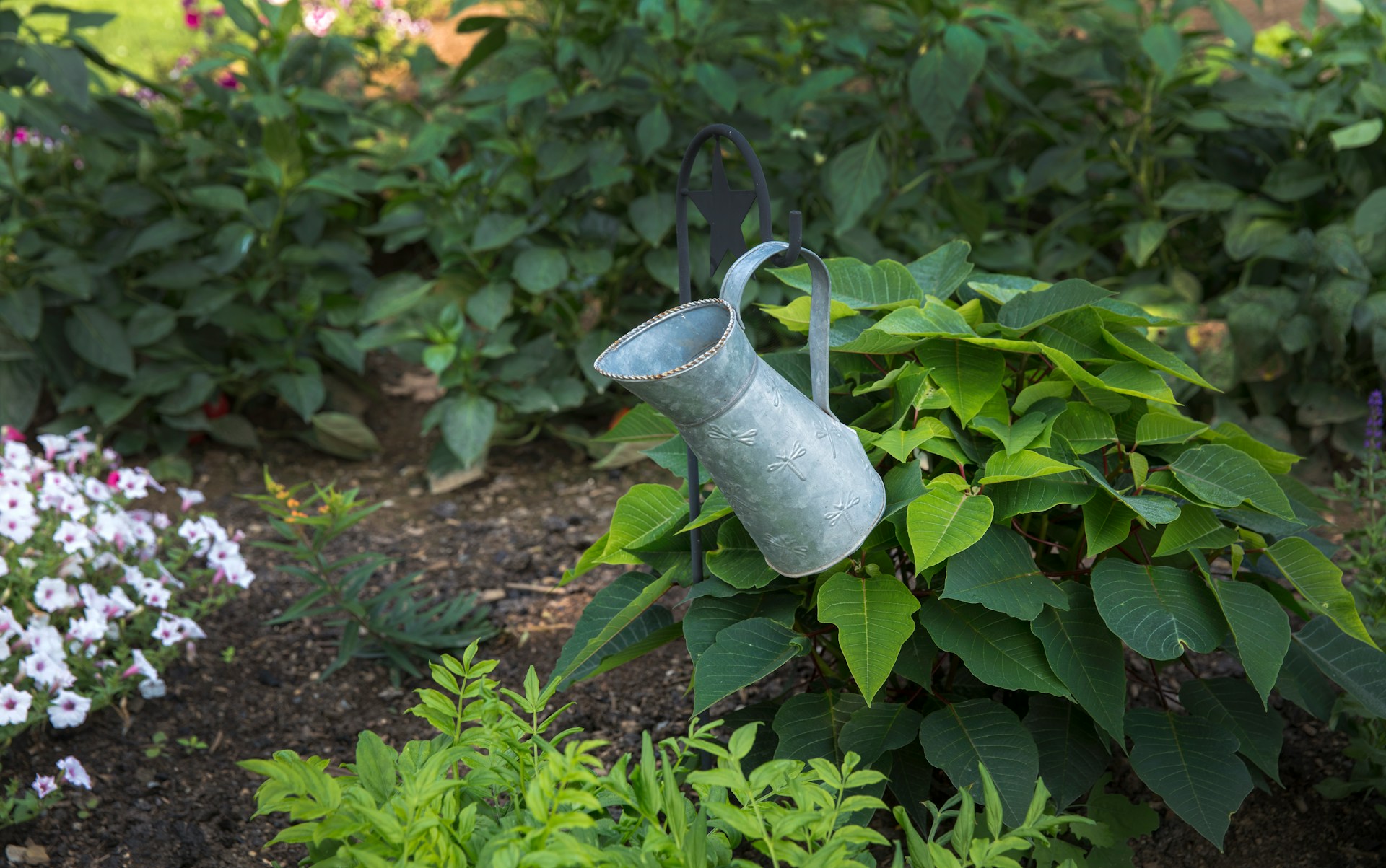
The easiest way to book quality trades
When your garden needs professional attention, understanding gardening costs can help you budget effectively and avoid unexpected expenses. Whether you need regular maintenance, seasonal cleanup, or specialist landscaping services, this comprehensive guide breaks down UK gardening costs by location, service type, and complexity.
Quick Answer: The average cost for gardeners in the UK ranges between £14 to £50 per hour depending on location, experience, and service complexity. Regular maintenance typically costs £20-£35 per hour, while specialist services like tree surgery or landscape design command premium rates of £40-£80+ per hour. London and major cities cost significantly more than rural areas.
Whether you're planning regular garden maintenance, seasonal tidy-ups, or major landscaping projects, this guide provides transparent pricing information to help you make informed decisions and choose the right professional for your garden's needs.
Average Gardener Costs in the UK (2025 Rates)
Understanding typical gardening prices helps you budget accurately and identify fair quotes when comparing different gardeners and garden services.
Standard Hourly Rates
Gardening professionals typically charge between £14-£25 per hour for standard maintenance work, though rates vary significantly based on experience, location, and service complexity.
National Average Breakdown:
- Trainee/apprentice gardeners: £12-£18 per hour (Learning on the job)
- General maintenance gardeners: £18-£30 per hour (2-5 years experience)
- Experienced gardeners: £25-£40 per hour (5+ years experience)
- Specialist gardeners: £35-£60 per hour (Tree surgery, design, pest management)
Landscape contractors: £40-£80+ per hour (Major projects, design work)
Most gardeners work on daily rates for larger projects, typically ranging from £150-£300 per day for labour, excluding materials and plants. This approach often provides better value for extensive work requiring full-day attention.
Many gardeners charge minimum periods of 2-3 hours, meaning you'll pay the full rate even for smaller jobs. This covers travel time, equipment transport, and basic overheads essential for maintaining professional garden services.
Regional Price Variations
Location significantly impacts gardening costs due to varying demand levels, living costs, and local competition affecting service pricing across different UK regions.
London and Southeast: £25-£60+ per hour
- Central London: £35-£60+ per hour
- Greater London: £30-£50 per hour
- Home Counties: £25-£40 per hour
Major Cities: £20-£45 per hour
- Manchester, Birmingham, Leeds: £22-£40 per hour
- Edinburgh, Glasgow: £20-£35 per hour
- Bristol, Newcastle: £18-£35 per hour
Regional and Rural Areas: £14-£30 per hour
- Wales, Northern England: £14-£25 per hour
- Southwest England: £16-£30 per hour
- Scotland (outside cities): £14-£28 per hour
Rural areas often see rates 20-40% lower than urban centres, though travel charges may apply for remote properties. Some gardeners charge mileage fees of £0.50-£1.50 per mile beyond their standard service area.
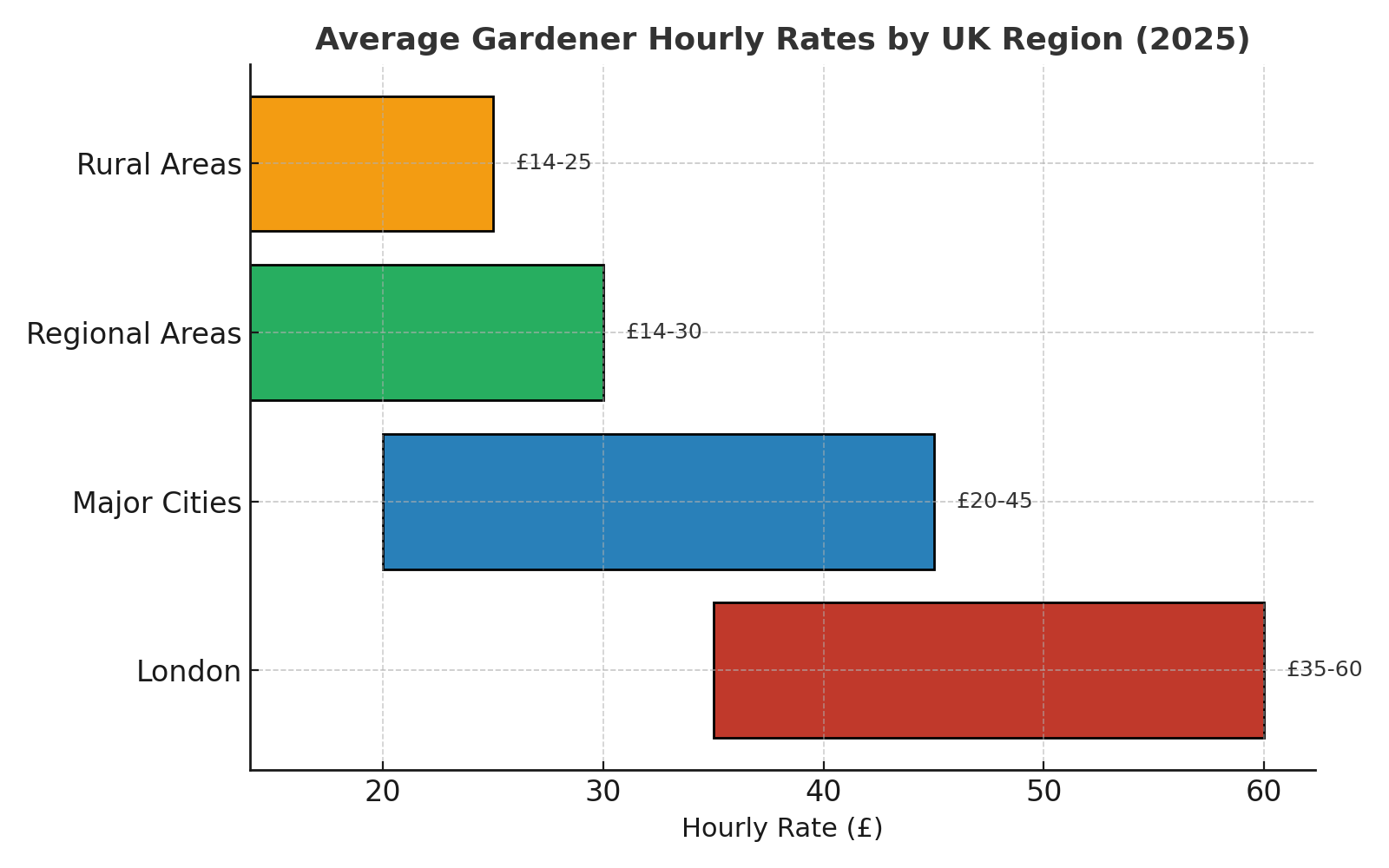
Emergency and Seasonal Garden Services
Garden emergencies and peak-season work command different pricing structures reflecting urgency, weather dependency, and seasonal demand variations across the gardening calendar.
Storm Damage and Emergency Work
Emergency garden services, such as storm damage cleanup or urgent tree removal, typically cost 50-100% more than standard rates due to immediate response requirements and potential safety hazards.
Emergency Rate Breakdown:
- Same-day callouts: 50% surcharge over standard rates
- Weekend emergency work: 75% premium
- Storm damage cleanup: £40-£80 per hour
- Emergency tree removal: £200-£800+ depending on size and complexity
Emergency work often requires specialist equipment and insurance, justifying higher rates while ensuring safety compliance during urgent garden interventions.
Seasonal Pricing Variations
Garden services experience significant seasonal demand fluctuations affecting pricing throughout the year, with spring and autumn representing peak periods for most garden maintenance work.
Seasonal Rate Variations:
- Spring preparation (March-May): Peak demand, rates 10-25% above average
- Summer maintenance (June-August): Standard rates, regular scheduling available
- Autumn cleanup (September-November): High demand, rates 10-20% above average
- Winter work (December-February): Reduced demand, potential 10-15% discounts
Planning garden work during off-peak periods can result in significant savings while ensuring access to preferred gardeners during less competitive booking periods.
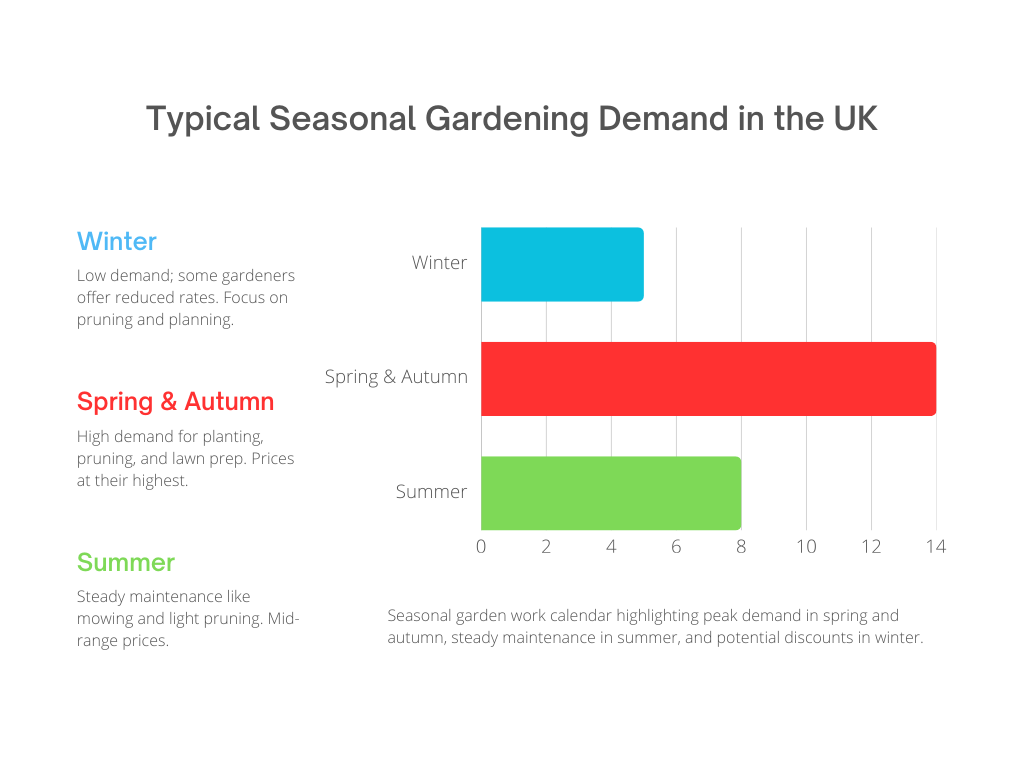
Need a gardening professional?
Get instant quotes from 3-5 vetted local tradespeople. Compare prices, reviews, and availability—all in one place.
Common Garden Service Costs
Understanding typical pricing for specific garden services helps budget effectively and identify reasonable quotes for various maintenance and improvement tasks. Seasonal maintenance programs represent one of the most cost-effective approaches to maintaining gardens throughout the year.
Regular Maintenance Services
Routine garden maintenance forms the foundation of most gardening contracts, with predictable costs allowing for effective annual budget planning.
Lawn Care:
- Basic mowing (small garden): £25-£45
- Mowing and edging (medium garden): £35-£70
- Full lawn treatment (large garden): £50-£120
- Lawn renovation: £8-£15 per square metre
General Garden Maintenance:
- Weeding and pruning: £20-£35 per hour
- Hedge trimming: £30-£60 per hour
- Border maintenance: £25-£40 per hour
- Seasonal cleanup: £150-£400 per visit
Plant Care:
- Planting new borders: £25-£45 per hour plus plants
- Rose pruning: £30-£50 per hour
- Fruit tree pruning: £40-£80 per tree
- Garden clearance: £150-£500 depending on size - often included as part of maintenance services
Specialist Garden Services
Specialist gardening services require advanced skills, specialist equipment, or professional qualifications, commanding premium rates reflecting expertise and potential risks involved. Understanding when to hire general gardeners versus specialists for services like hedge trimming helps optimize spending and results.
Tree Services:
- Tree pruning: £150-£600 per tree
- Tree removal: £300-£2,000+ depending on size
- Stump grinding: £80-£200 per stump
- Tree health assessment: £100-£300
Landscaping Projects:
- Garden design consultation: £300-£800
- Patio installation: £50-£150 per square metre
- Fence installation: £25-£75 per metre
- Water feature installation: £500-£3,000+
Pest and Disease Management:
- Garden pest control: £80-£200 per treatment
- Lawn disease treatment: £150-£400
- Soil testing and analysis: £50-£150
- Organic treatment programs: £200-£600 annually
Seasonal Garden Projects
Seasonal projects often represent the best value as gardeners can plan work efficiently during specific periods when conditions are optimal for particular tasks.
Spring Services:
- Garden preparation: £200-£500
- New planting schemes: £300-£800
- Lawn renovation: £400-£1,200
- Greenhouse setup: £150-£400
Autumn Services:
- Leaf clearance: £100-£300
- Winter plant protection: £150-£350
- Garden tidy-up: £200-£600
- Bulb planting: £20-£40 per hour plus bulbs
Learn more about comprehensive winter garden preparation and professional techniques for protecting plants before the coldest months.
Factors Affecting Gardener Costs
Multiple variables influence gardening prices beyond basic hourly rates, creating significant cost variations for similar work depending on timing, complexity, and specific garden conditions.
Garden Size and Complexity
Garden dimensions and complexity levels significantly impact both time requirements and specialist knowledge needed, directly affecting total project costs and ongoing maintenance expenses.
Small urban gardens (up to 50 square metres) typically require 2-4 hours for comprehensive maintenance, making them cost-effective for regular upkeep. However, per-square-metre costs may be higher due to travel time and minimum charge periods affecting smaller properties disproportionately.
Medium suburban gardens (50-200 square metres) represent optimal value, allowing gardeners to work efficiently while spreading travel and setup costs across meaningful work periods. These gardens typically support sustainable maintenance schedules with predictable seasonal requirements.
Large gardens (200+ square metres) often benefit from day-rate pricing and may qualify for bulk discounts when booking comprehensive maintenance programs. However, specialist areas like extensive borders, multiple lawn areas, or mature tree collections require additional expertise and time allocation.
Complex garden features significantly influence pricing structures. Water features, rockeries, topiary, and specialist plant collections demand enhanced knowledge and careful maintenance techniques. Gardens with difficult access, steep slopes, or delicate plant materials typically incur 10-30% surcharges reflecting increased difficulty and time requirements.
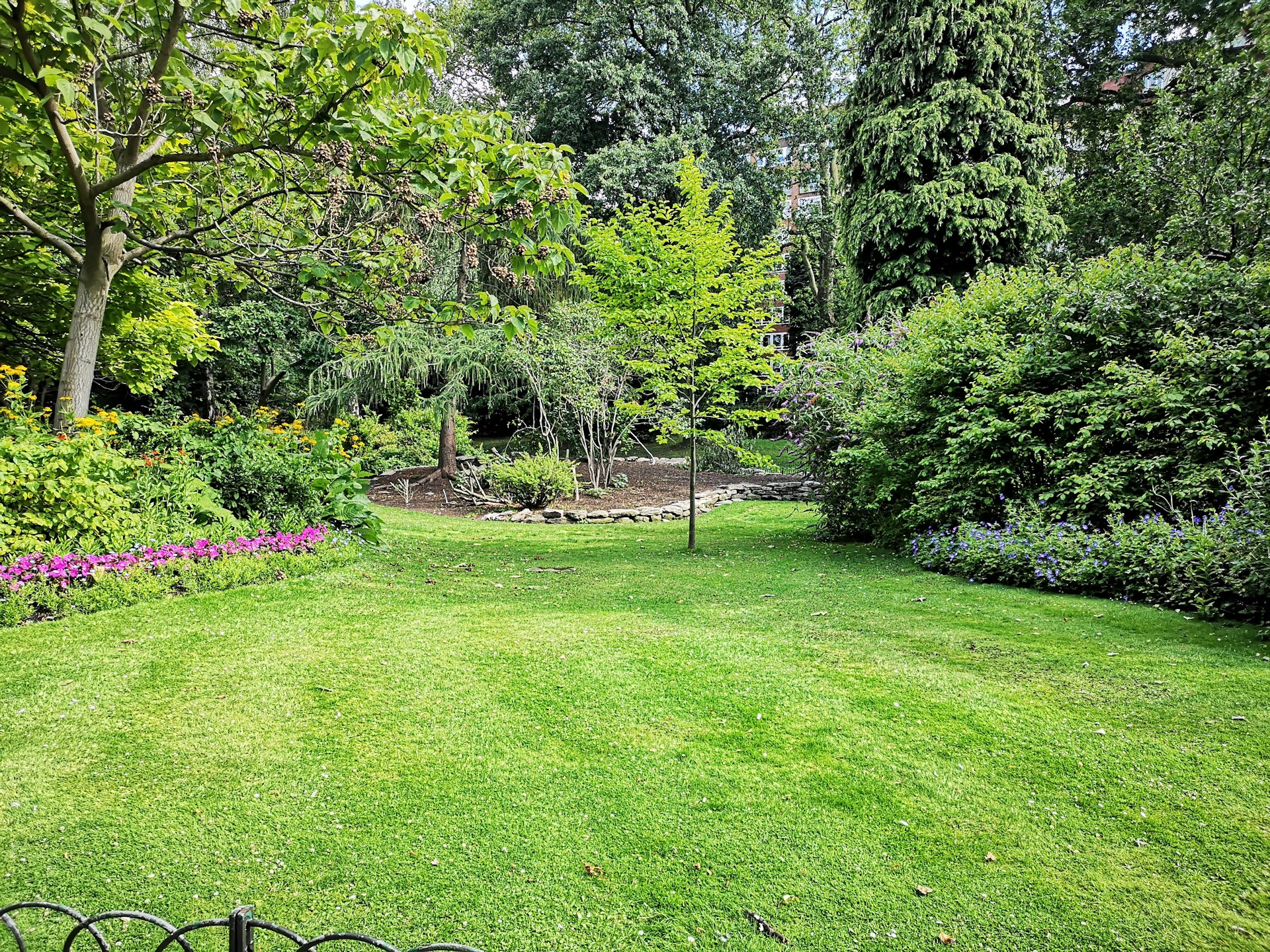
Ready to hire a trusted gardening?
Compare quotes, read verified reviews, and hire with confidence. Our platform connects you with local professionals who are ready to help.
Instant Quotes
Responses within 24 hours
Verified Reviews
Real customer feedback
No Commitment
Choose when you're ready
Access and Location Factors
Property accessibility and location characteristics substantially impact service costs, with some situations attracting significant surcharges above standard rates for additional time and difficulty involved.
Ground-level gardens with clear access routes, adequate parking, and standard working conditions typically incur no additional charges. However, properties with restricted access, steep terrain, or limited parking may require additional time and effort reflected in higher overall costs.
Urban properties often face unique challenges including parking restrictions, congestion charges, and limited equipment storage space. Central London properties may incur daily congestion charges passed to customers, while restricted parking can extend job duration when gardeners must repeatedly move vehicles or carry equipment over extended distances.
Rural properties present different considerations, often involving extended travel times and potential material sourcing challenges. While hourly rates may be lower in rural areas, travel charges and limited local competition can offset these advantages, particularly for smaller jobs requiring specialist equipment or materials.
Seasonal Demand and Weather Dependency
Weather conditions and seasonal demand create significant cost variations throughout the gardening year, with peak periods commanding premium pricing while off-season work may offer substantial savings opportunities.
Spring represents peak demand as gardens require preparation after winter dormancy. Demand for soil preparation, new planting, and lawn renovation creates competitive booking situations, often resulting in 15-25% premium pricing during March through May. Planning spring work during late winter can secure better rates and preferred scheduling.
Summer provides optimal working conditions with predictable weather patterns supporting efficient service delivery. Standard rates typically apply during summer months, with regular maintenance schedules offering the best value for ongoing garden care throughout the growing season.
Autumn experiences high demand for seasonal cleanup, leaf clearance, and winter preparation work. Limited daylight hours and weather-dependent working conditions can create scheduling pressures resulting in premium pricing for urgent autumn tasks.
Winter offers potential savings for non-weather-dependent work such as hard landscaping, fence installation, and garden planning. Many gardeners offer competitive rates during quiet periods, making winter ideal for major projects that don't require optimal growing conditions.
How to Save Money on Garden Services
Strategic planning and informed decision-making can significantly reduce gardening expenses without compromising quality or garden health, focusing on timing, preparation, and service optimization.
Timing Your Garden Work
Scheduling flexibility represents the most effective method for controlling gardening costs, with potential savings of 20-40% through strategic timing that avoids peak demand periods.
Booking work during off-peak periods provides access to better rates and more flexible scheduling options. Late winter and early summer typically offer the most competitive pricing as demand pressures are reduced, and gardeners actively seek work to maintain consistent schedules.
Bundling multiple services together maximizes efficiency and often reduces total costs compared to individual visits. Combining routine maintenance with seasonal tasks, small repairs, or plant installations eliminates multiple call-out charges while allowing gardeners to work more efficiently across related activities.
Advanced booking for seasonal work secures better rates and ensures availability during peak periods. Planning spring preparation in February or autumn cleanup in early September provides negotiating power and helps avoid premium pricing associated with last-minute bookings.
Working with Garden Professionals
Building long-term relationships with reliable gardeners often results in better rates, priority scheduling, and enhanced service quality reflecting mutual trust and understanding of specific garden requirements.
Regular maintenance contracts typically offer 10-20% savings compared to ad-hoc bookings while ensuring consistent garden care throughout the year. Annual agreements provide budget certainty and guarantee regular attention preventing minor issues developing into expensive problems.
Flexible scheduling arrangements can reduce costs significantly. Allowing gardeners to schedule work based on weather conditions and their availability often results in better rates while ensuring optimal working conditions for garden tasks.
Material and Plant Purchasing
Smart procurement of materials and plants can reduce project costs substantially while maintaining quality and ensuring appropriate plant selection for specific garden conditions and requirements.
Purchasing plants and materials directly can save 20-40% on costs, though this may affect warranty coverage and professional advice availability. Many gardeners will work with customer-supplied materials while maintaining quality standards and providing installation warranties.
Seasonal plant purchasing offers significant savings opportunities. End-of-season sales, bare-root plants during dormant periods, and bulk purchasing for larger projects can substantially reduce material costs while achieving professional planting results.
Group purchasing with neighbours or friends can unlock trade discounts and reduce delivery charges for bulk materials such as compost, mulch, or paving materials. Coordinating projects can also reduce individual service costs through shared mobilisation expenses.
DIY vs Professional Decisions
Understanding which garden tasks are suitable for DIY completion versus those requiring professional expertise helps optimize spending while maintaining garden health and avoiding costly mistakes.
Basic maintenance tasks including lawn mowing, light weeding, deadheading, and watering can be safely completed by competent homeowners using appropriate tools and following seasonal timing guidelines. These activities require minimal expertise while providing satisfaction and cost savings.
However, certain tasks require professional attention due to safety, expertise, or equipment requirements. Tree work above ground level, electrical installations for lighting or water features, and structural landscaping projects demand qualified professionals with appropriate insurance and specialist knowledge.
Plant identification, disease diagnosis, and pest management often benefit from professional expertise preventing costly mistakes that could damage entire garden areas. Professional soil analysis and plant selection ensure optimal growing conditions and long-term garden success.
Finding Qualified Garden Professionals
Selecting appropriate garden professionals ensures quality results while protecting against unqualified operators who may cause expensive damage or provide unsatisfactory service affecting garden health and property values.
Essential Qualifications and Insurance
Professional gardeners should possess relevant qualifications, current insurance coverage, and demonstrable experience appropriate to your specific garden requirements and project complexity.
Key Qualifications to Look For:
- RHS (Royal Horticultural Society) qualifications demonstrating horticultural knowledge
- City & Guilds Horticulture certification
- LANTRA training certificates for machinery operation
- Tree surgery qualifications (NPTC) for tree work
- Pesticide application certificates (PA1, PA6) where relevant
Insurance Requirements:
- Public liability insurance (minimum £1-2 million)
- Employer's liability insurance for teams
- Professional indemnity insurance for design work
- Tool and equipment insurance
Professional Body Memberships
Membership of professional organizations indicates commitment to industry standards, ongoing training, and adherence to ethical business practices providing additional consumer protection and service quality assurance.
According to the Royal Horticultural Society, the UK's leading gardening charity, professional development and standardized training ensure gardeners maintain current knowledge of best practices, plant health, and sustainable gardening techniques.
Relevant Professional Bodies:
- Royal Horticultural Society (RHS) - Professional membership
- Landscape Institute - For landscape design and construction
- Association of Professional Landscapers (APL)
- Arboricultural Association - For tree specialists
- British Association of Landscape Industries (BALI)
Getting Accurate Quotes Through FixaTrader
Our platform connects you with qualified garden professionals across the UK, ensuring competitive pricing while maintaining quality standards and professional accountability throughout your garden projects.
When requesting quotes, providing comprehensive information ensures accurate pricing and prevents unexpected costs later. Include clear photos showing your garden's current condition, detailed descriptions of the work required, and specific information about garden size and access arrangements. Be upfront about your preferred timing, frequency of visits, budget constraints, and any specific plant preferences or restrictions that might affect the work.
Professional quotes should provide complete transparency with detailed breakdowns of all costs, specific plants and materials specifications, and clear timelines for project completion. Look for comprehensive warranty terms covering both plants and workmanship, along with clear payment schedules and ongoing maintenance recommendations that help maintain your garden's health long-term.
Our platform protects customers through secure payment systems that hold funds until work completion, verified professional credentials and insurance coverage, and comprehensive customer review systems ensuring quality assurance. We provide dispute resolution support when needed and maintain transparent pricing with no hidden fees or unexpected charges throughout the process.
- Post a job (include details, images, location and budget)
- Receive quotes from professional tradespeople
- Review (credentials, post-work, reviews and price)
- Pay Securely (we pay-out once the job is completed)
- Enjoy! (hassle-free and on-demand)
Seasonal Garden Planning and Budgeting
Effective garden budgeting requires understanding seasonal requirements and planning expenses throughout the year to maintain garden health while controlling costs through strategic timing and resource allocation.
Annual Garden Budget Planning
Creating comprehensive annual garden budgets helps spread costs effectively while ensuring consistent garden care throughout changing seasonal requirements and varying maintenance demands. Most homeowners should expect regular monthly maintenance costs between £150-£400, with seasonal cleanups twice yearly adding £300-£800 to annual expenses. Plant replacement and additions typically require £200-£600 annually, while specialist services including pruning and treatments average £300-£800 per year.
Successful budget optimization focuses on planning major projects during off-peak periods when rates are more competitive, bundling services to reduce individual call-out costs, and investing in preventive care to avoid expensive emergency interventions. Long-term maintenance contracts often provide better value than ad-hoc bookings, while maintaining emergency reserves of 10-20% of your total garden budget helps manage unexpected issues without derailing overall financial planning.
Monthly Garden Service Planning
Understanding monthly garden requirements helps distribute costs evenly while ensuring timely attention to seasonal tasks preventing problems and maintaining garden health throughout the year.
Spring months from March to May focus on soil preparation and new planting, lawn renovation and treatment programs, essential pruning and hedge maintenance, plus implementing pest and disease prevention programs that protect gardens throughout the growing season. Summer gardening from June through August emphasizes regular lawn maintenance, watering system upkeep, ongoing pest management, and harvesting activities that maximize garden productivity.
Autumn work from September to November centres on leaf clearance and composting, winter plant protection measures, tool maintenance and storage preparation, plus bulb planting for spectacular spring displays. Winter months from December through February provide opportunities for planning and design work, hard landscaping projects that avoid disrupting growing plants, tool servicing and replacement, plus early ordering of plants and materials to secure better pricing and availability for the coming season.
Planning Your Garden Budget
Understanding UK gardening costs enables effective budget planning and informed decision-making for maintaining and improving your outdoor spaces throughout the year while achieving optimal value from professional garden services.
Key Takeaways for 2025:
- Standard maintenance rates: £20-£40/hour depending on location and experience
- Specialist services: £40-£80+/hour for tree work, design, and complex projects
- London premium: 30-60% above national averages
- Rural areas: Often 20-40% below national averages with potential travel charges
- Seasonal planning saves money: off-peak scheduling reduces costs significantly
- Regular maintenance prevents expensive emergencies and major problems
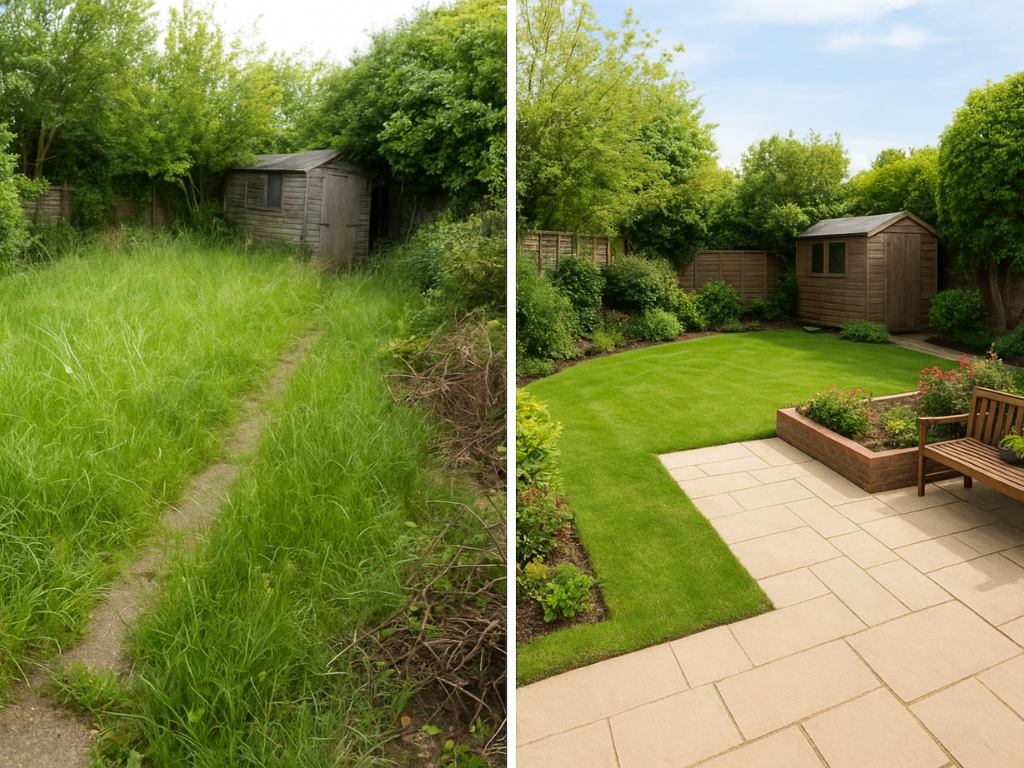
Whether planning routine maintenance or major garden improvements, this pricing guide provides the foundation for cost-effective decisions about your garden investment. Remember that the lowest quote isn't always the best value - consider qualifications, insurance, warranties, and reputation when selecting garden professionals.
For optimal value, schedule non-urgent work during off-peak periods, invest in regular maintenance programs, and verify professional credentials before committing to significant garden projects that will enhance your property value and outdoor enjoyment.
